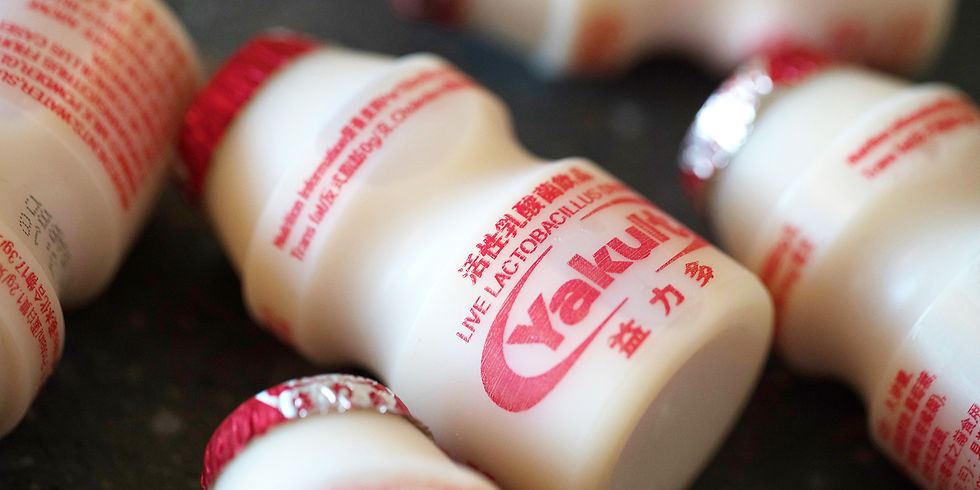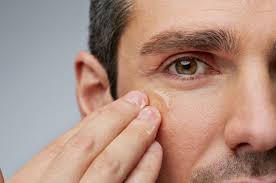Fermentation: Gut & Skin Health
- Morag Steyn

- Apr 26, 2022
- 8 min read
Updated: Sep 20, 2023
Firstly, lets get the basics down: This is the most amazing topic this year!
Fermentation is a process in which bacteria and yeast break down sugars.
Gut Health
Your gut, located in your intestinal tract is said to be the actual brain of your body, because it basically keeps your bad bacteria in check, which in turn can affect your hormone function.
Not only does it enhance food preservation, but eating fermented foods can also boost the number of beneficial bacteria, or probiotics, in your gut.
Gut health, describes the function and balance of bacteria of the many parts of the gastrointestinal tract. Ideally, organs such as the oesophagus, stomach and intestines all work together to allow us to eat and digest food without discomfort.
Fermented Foods and Drinks to Boost Digestion and Health

1. Kefir
Kefir is a type of cultured dairy product.
It’s made by adding kefir grains — which are a combination of yeast and bacteria — to milk. This results in a thick, tangy beverage with a taste that’s often compared to yogurt. Studies reveal that kefir has numerous health benefits, from digestion to inflammation to bone health. Kefir also contains less lactose than milk. When kefir grains and milk are combined to make kefir, the bacteria in the grains help ferment and break down the lactose in the milk (5). Another older study found that consuming 6.7 ounces (200 mL) of kefir daily for 6 weeks decreased markers of inflammation, which is known to contribute to chronic conditions like heart disease and cancer.
This tangy drink may also boost bone health.
You can enjoy kefir on its own or blend it into smoothies and drinks.

2. Tempeh
Tempeh is made from fermented soybeans that have been pressed into a compact cake.
This high protein meat substitute is firm but chewy and can be baked, steamed, or sautéed before being added to dishes.
In addition to its impressive probiotic content, tempeh is rich in many nutrients that may improve your health. For example, soy protein has been shown to help reduce certain risk factors for heart disease.
Tempeh is perfect for vegetarians and omnivores alike. It’s particularly suited to dishes like sandwiches and stir-fries.

3. Natto
Natto is a staple probiotic food in traditional Japanese cuisine.
Like tempeh, it’s made from fermented soybeans. It has a very strong flavor and slimy texture. It contains a good amount of fiber. Fiber may help support digestive health. It moves through your body undigested, adding bulk to stool to help promote regularity and alleviate constipation.
Natto is also high in vitamin K, an important nutrient that’s involved in calcium metabolism and bone health.
Natto is often paired with rice and served as part of a digestion-boosting breakfast.

4. Kombucha
Kombucha is a fermented tea that’s fizzy, tart, and flavorful. It’s made from either green or black tea and offers these drinks’ potent health-promoting properties.
Animal studies show that drinking kombucha may help prevent liver toxicity and damage caused by exposure to harmful chemicals. Plus, test-tube studies have found that kombucha may help induce cancer cell death and block the spread of cancer cells. Some animal studies have even found that kombucha helped reduce blood sugar, triglycerides, and LDL (bad) cholesterol. (24Trusted Source, 25).

5. Miso
Miso is a common seasoning in Japanese cuisine. It’s made by fermenting soybeans with salt and koji, a type of fungus.
It’s most often found in miso soup, a flavorful dish made of miso paste and stock. Miso soup is traditionally served for breakfast.
Miso may also help lower blood pressure and protect heart health.
Besides stirring miso into soup, you can try using it to:
glaze cooked vegetables
spice up salad dressings
marinate meat

6. Kimchi
Kimchi is a popular Korean side dish that’s usually made from fermented cabbage or other fermented veggies like radishes.
It boasts an extensive array of health benefits and may be especially effective at lowering cholesterol and reducing insulin resistance.
Insulin is responsible for transporting glucose from your blood to your tissues. When you sustain high levels of insulin for long periods, your body stops responding to it normally, resulting in high blood sugar levels and insulin resistance.
Kimchi is easy to make and can be added to everything from noodle bowls to sandwiches.

7. Sauerkraut
Sauerkraut is a popular condiment consisting of shredded cabbage that has been fermented by lactic acid bacteria.
It’s low in calories but contains plenty of fiber and vitamins C and K. Like other foods made with leafy green vegetables, it also contains a good amount of lutein and zeaxanthin. These antioxidants help promote eye health and reduce your risk of eye disease.
The antioxidant content of sauerkraut also boasts promising effects on cancer prevention. One test-tube study showed that treating breast cancer cells with cabbage juice decreased the activity of certain enzymes related to cancer formation.
You can use sauerkraut in countless dishes, from casserole to soup to sandwiches. To get the most health benefits, be sure to choose unpasteurized sauerkraut since pasteurization kills beneficial bacteria.

8. Probiotic yogurt
Yogurt is produced from milk that has been fermented, most commonly with lactic acid bacteria. It’s high in many important nutrients, including calcium, potassium, phosphorus, riboflavin, and vitamin B12.
Yogurt has also been associated with a wide variety of health benefits.
This creamy dairy product may also help prevent weight gain.
Remember that not all yogurts contain probiotics, as these beneficial bacteria are often killed during processing. Look for yogurts that contain live cultures to make sure you’re getting your dose of probiotics. Additionally, opt for products with minimal sugar.
Skin Health
The one benefit I am after though is amazing skin, of course....
In the skin-care world, the fermentation process makes ingredients more potent, and let me tell you the microbiome skincare boom is thriving, and we all have to get in before we regret it.

Take a peek at some of the buzziest beauty products that have launched in the last few months, and you'll find they have a single word in common: they are fermented. Though the use of fermented ingredients in skin care is hardly a new concept, it's hitting the aisles hard in 2021. And the reason, according to dermatologists, is that we're learning just how beneficial these formulas can be for the health of our skin microbiome.
Fermentation is deeply rooted in culture and based on ancient beauty techniques; it has the remarkable capacity to boost effectiveness of any ingredient and extend the shelf life of products. It changes the chemical structure of the ingredient by breaking it down into the basic building blocks. I know this sounds extremely chemical and scientific but its really amazing.

To understand fermented skincare, it helps to learn a little about fermentation. Fermentation is a method of food preservation that has been used for centuries. The main ingredient used in Japanese fermentation is a cultured grain known as Koji. When food is allowed to culture, it releases hundreds of enzymes and compounds that change its molecular structure. By fermenting the ingredients, you’re essentially altering the ingredients to increase its nutritional value. Often this makes it richer in vitamins, peptides, and probiotics, taking the original substance to a whole new level.
Over the last five years, the brains behind big beauty brands have become acutely aware of the importance of the skin microbiome— which is the ecosystem of bacteria that lives on the surface of your skin and helps to protect it from the outside world. Skin has its own natural flora of bacteria, and if you can keep that intact or enhance that, you can charm your skin into doing a lot of other healthy things like calming inflammation, helping acne, eczema, and rosacea, and that's where fermented ingredients come in.

These "basic building blocks" include vitamins, essential minerals, and amino acids in their purest form. Fermented skin-care products generally contain higher, more potent concentrations of vitamins and antioxidants, which help to fight free-radical damage and protect against UV damage. Fermentation can also produce fruit and sugar acids, which exfoliate skin for a healthy glow, plus amino acids, which act as the building blocks of peptides to help fight fine lines and wrinkles.
Aside from the fact that they tend to deliver a laundry list of potent ingredients, what's really exciting about fermented products is their ability to help balance the skin microbiome. You're enhancing your skin with a better environment for calmer, less inflamed skin, and a more intact skin barrier.

You’ll love fermented skincare as much as your Kombucha cocktails because, let’s face it, fermentation gives you a serious boost of nutritional benefits. But what else can it do?
The main draw of fermentation is the production of probiotics. Fermented skincare works by balancing good and bad bacteria on your skin. Did you know that there’s a ton of bacteria on your skin? The collection of bacteria is called microbiome. This may sound scary, but not all bacteria are bad. Some are bad, such as acne-causing bacteria, while others can be essential to maintaining healthy skin. When your skin’s microbiome gets thrown off balance, bad bacteria can fester and cause good bacteria to die off. This can cause issues such as skin irritations, sensitivity, and acne.

If you’re on the hunt for skincare products you might not realise that while the ingredients in some skincare products are beneficial to your skin, the molecular structure of the ingredients may be too large to penetrate your pores. Fermentation is the holy grail of beauty products because during the culture process complex compounds are broken down into simple compounds. This allows the ingredients to be more readily be absorbed by your skin to amplify the nutritional impact. It’ll feed your skin at a deeper level. The ingredients are then better able to do their job, whether it’s fighting free radicals or acne.
There are many different kinds of fermented ingredients, the one that's best suited for your routine comes down to what skin issues you're looking to treat.
1. For fighting fine lines and wrinkles: Amino acids
“If you have fine lines, look for products with amino acids which help to firm skin," says Dr. Chang. Amino acids are the building blocks of protein (you may remember that from high school chem), and applying them topically will help build collagen beneath the surface while also boosting hydration and calming inflammation. Most amino acids in skin care come by way of the fermentation process, so if you see the term on the label, it's safe to assume you're getting all of the skin-supporting benefits of a fermented product.

2. Brightening & Exfoliating: Sugar acids
Though you may not realize it, many of the chemical exfoliants that are already in your routine come from fermented ingredients: Alpha-hydroxy acids are actually a byproduct of plant fermentation. Glycolic acid is fermented sugar, mandelic acid comes from almonds, and (as mentioned) lactic acid comes from milk. "If a brightening effect is what you’re after, look for products with fruit and sugar acids," says Dr. Chang. These acids work to weaken the bonds between dead skin cells and the surface of your skin, whisking them away to allow fresh, new cells to shine.
3. Environmental protection: Fermented antioxidants
Antioxidants are an important part of any a.m. routine, thanks to the fact that they help defend against environmental factors, like pollution and UV rays, which cause free radical damage. While antioxidants in any form are great, using a fermented version can offer even more protection. "The fermentation process cultivates and increases antioxidant compounds significantly, specifically phenolics and flavonoids, by breaking down and potentiating the plant or fruit material. Black tea, for example, is rich in antioxidant compounds, but when it's fermented into kombucha, its antioxidant power becomes even more potent... and that translates into skin care. "Phenols, [one of the antioxidants in black tea that increases in the fermentation process], are particularly beneficial to skin due to their broad-spectrum antioxidant activity, helping to defend and ward off multiple forms of oxidative damage.

















Comments